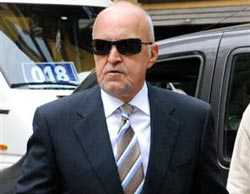The journalist’s remarks are a continuation of a series of confessions he has made since last week.
 Veteran secular journalist Mehmet Ali Birand has said the Republic of Turkey, which Mustafa Kemal Atatürk established and entrusted to the military, has had two big enemies over the years: pious Muslims and Kurds.
Veteran secular journalist Mehmet Ali Birand has said the Republic of Turkey, which Mustafa Kemal Atatürk established and entrusted to the military, has had two big enemies over the years: pious Muslims and Kurds.
The journalist’s remarks were published in a column titled “Why did we support coups?” published by the Posta daily on Tuesday.
According to the journalist, the military was traditionally provoked by secularist circles to stage coups in Turkey.
“It has always been secular circles in society that pushed and forced the military for coups. The breakdown of secular circles is as follows: The Republican People’s Party [CHP], which is made up of social democrat politicians. Among them are people who know that they cannot reach any good position [in politics] through elections and therefore seek to be appointed to high positions thanks to the military. Mid-sized and large capital groups. Retired and employed judicial bureaucrats. Academics. Retired and active duty members of the military. The media. We all had a common goal: not to share our self-built system,” Birand stated.
The journalist’s remarks are a continuation of a series of confessions he has made since last week.
In a column dated May 19, Birand said pro-coup thoughts penetrated the genes of a majority of members of the secular mainstream media. For him, the mainstream media considered the General Staff as superior to democracy and Parliament until the recent past. “We tolerated all coups. And we supported them. Our genes got confused in the past few years, and we started to look at things from a different perspective. The order between democracy and Parliament and the General Staff changed for the first time. Democracy moved one step forward.”
So far Turkey has witnessed three direct military coups — in 1960, 1971 and 1980 — and an unarmed military intervention in 1997, which is called a postmodern coup. The coups were not, however, acts a junta nested within the Turkish Armed Forces (TSK) staged on its own. Some media groups displayed a “contributive” role, which came either as a covert or open support for the military to seize control of the country. Each coup was bloody and inflicted deep sufferings on Turkey.
In Tuesday’s column Birand also wrote about the perception of pious Muslims and Kurds in Turkey by secular circles.
“The Republic of Turkey, established by [Mustafa Kemal] Atatürk and entrusted to the military [for protection], has had two big enemies over the years: reactionaryism and the Kurdish question.”
According to Birand, reactionaryism has been the most talked-about and dealt-with enemy.
“Newspapers would publish the photos of bearded men, and stories would read that ‘two more reactionaries have been captured.’ Black chador-wearing women would be called ‘black cockroaches.’ For us, there was no distinction between pious Muslims and reactionaries. They would be considered the biggest enemy of our self-built system. We had no tolerance to see them among us. We did not try to understand them.”
With regard to Kurds, the journalist said the “Kurdish question” was another most-feared enemy for secular circles that was not ever mentioned. “Each uprising of Kurds was defined as ‘insurgence’ and a ‘path to independence.’ The actual reasons [leading to uprisings] were never examined. We did not ever think that they could have stemmed from poverty, the feudal system or conditions in the region. When the Kurdish question was mentioned, we all thought about the division of Turkey. We continuously maintained a policy of assimilation and denial of the Kurdish identity,” Birand said.
Cihan news agency

Leave a Reply